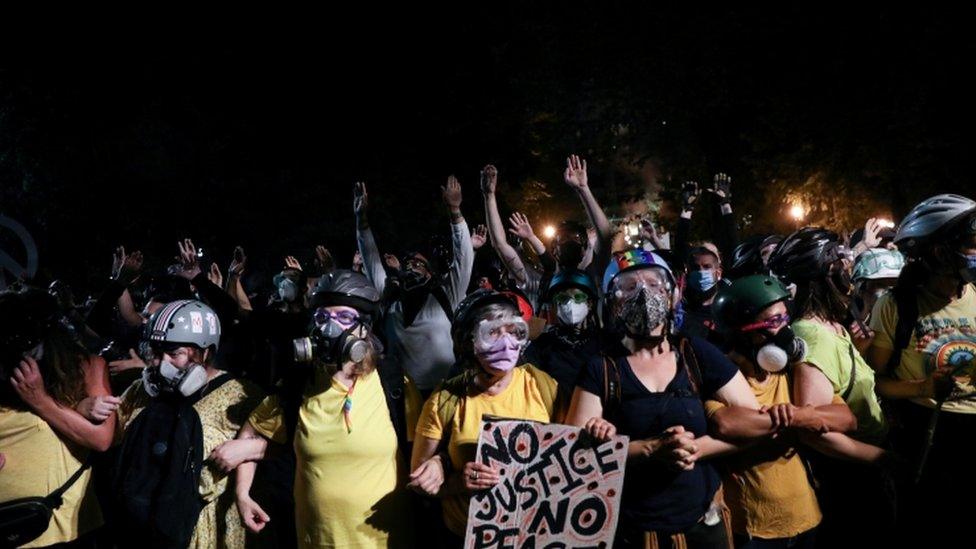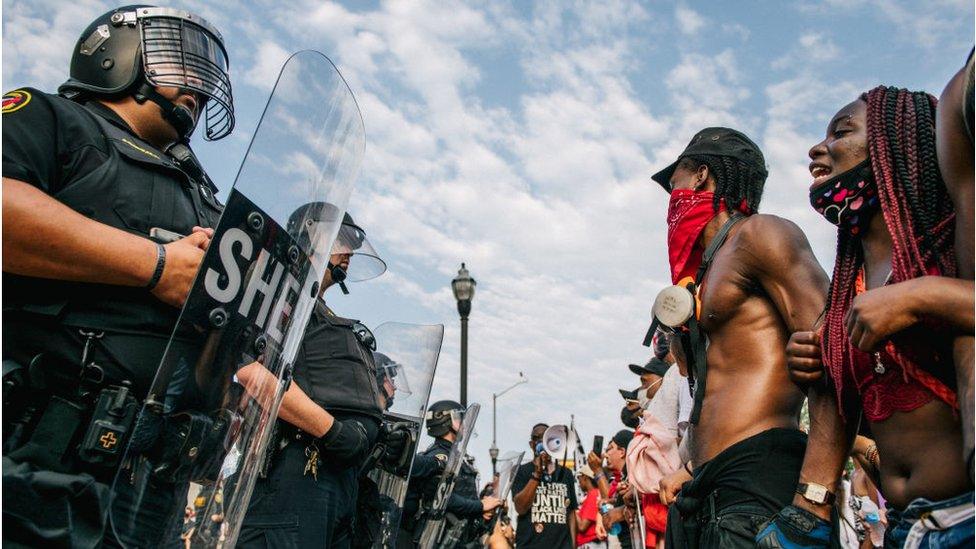Trump defends supporters accused in deadly clashes
- Published
President Trump declines to condemn his supporters for their role in recent deadly street clashes
US President Donald Trump has defended supporters for their alleged roles in recent deadly street clashes.
He suggested a teen accused of killing two in Wisconsin last week and Trump fans involved in clashes in Oregon on Saturday had acted in self-defence.
He said Joe Biden, his Democratic challenger in the 3 November election, had not specifically disavowed far-left activists accused of civil disorder.
The violence has come amid widespread, largely peaceful anti-racism protests.
Mr Biden, leading in opinion polls ahead of the election, has spoken out against violence, accusing Mr Trump of causing the divisions that have stoked it.
'Paint is not bullets'
At Monday's White House news conference, Mr Trump blamed Mr Biden and his allies for violence in cities run by Democratic mayors and governors.
A CNN reporter asked the Republican president whether he would condemn Trump supporters who had fired paint pellets during a confrontation with counter-protesters at the weekend in Portland, Oregon.
In the ensuing street clashes, Aaron Danielson - a member of a far right group, Patriot Prayer - was killed by a suspect who has reportedly described himself as a member of antifa, a network of mainly far-left activists.
Mr Trump described the protest as "peaceful" and said paint was "a defensive mechanism, paint is not bullets".
He told the reporter: "Your supporters, and they are your supporters indeed, shot a young gentleman who - and killed him, not with paint but with a bullet. And I think it's disgraceful."
Another reporter asked Mr Trump whether he would condemn a shooting in Kenosha, Wisconsin, allegedly by a teenager once pictured at one of the president's rallies.
Kyle Rittenhouse, 17, is accused of shooting three people, two fatally, last week amid demonstrations in the city over the police shooting of an African American man, Jacob Blake.
"We're looking at all of that," Mr Trump said in his first public comments about the suspect who was seen on video being pursued down a street and firing a weapon.
"That was an interesting situation, you saw the same tape as I saw, and he was trying to get away from them, I guess, it looks like. And he fell, and then they very violently attacked him.
"And it was something that we're looking at right now, and it's under investigation.
"I guess he was in very big trouble, he probably would have been killed."
Two Democratic congressmen pilloried Mr Trump for the remarks. Joe Kennedy III of Massachusetts tweeted: "This is the United States President justifying a double murder by a white man illegally carrying an assault rifle across state lines."
Kyle Rittenhouse, who was charged as an adult, has not yet been brought to trial.
Representative Eric Swalwell of California tweeted that the president had just made Republicans "the Mass Shooter Party".
Joe Biden: "Fires are burning and we have a president who fans the flames"

Lines drawn on law and order
Aleem Maqbool, BBC News, Kenosha
Throughout the summer, President Trump has referred to those taking to the streets across America as looters, rioters, anarchists and thugs. That is even though most of the demonstrations calling for an end to racial injustice, and to police brutality, have been peaceful.
But just as Democrats accuse the president of exploiting and even stoking the unrest for political gain, so Donald Trump's supporters accuse Democrats of the same thing.
"Our mayor is a Democrat, the governor is a Democrat, and the fact that they refused help early on just shows me that they were playing politics," one Trump supporter in Kenosha told me this evening.
In fact, the Wisconsin governor called in the National Guard the day after Jacob Blake was shot by a police officer in the city.
But with the aggressive messaging on law and order coming from the White House, the battle lines have been drawn on this issue - one we will be hearing much more of over the next nine weeks.

'Do I look like a radical socialist?'
Earlier on Monday, Mr Biden forcefully condemned the violence at recent protests while accusing President Trump of making the country unsafe.
It was the Democratic nominee's most determined effort yet to counter Republican criticism that he was weak on law and order.
"Do I look like a radical socialist with a soft spot for rioters?" said Mr Biden, speaking in Pittsburgh, in the critical US election state of Pennsylvania. "Really?"
The former US vice-president accused Mr Trump of having fomented violence in the US for years.
A look back at Joe Biden's life and political career
"You know," said Mr Biden, "he may believe mouthing the words law and order makes him strong but his failure to call on his own supporters to stop acting as an armed militia in this country shows how weak he is."
"Does anyone believe there will be less violence in America if Donald Trump is re-elected?" he asked.
The Democratic nominee took no questions from the media.
Mr Biden's remarks represented a pivot from his main line of attack so far - that the White House has mishandled its response to the coronavirus pandemic, which has killed more than 180,000 people in the US.


Biden 'urged to be more vocal on unrest'
Mr Biden spoke out against violent protests a number of times between May and July, according to a Washington Post fact-check, external.
Democrats hardly touched on the issue during their convention from 17-20 August, focusing instead on racial justice and African-American victims of police brutality. Rioting and looting was a central theme of the Republican convention a week later.
Since the shooting of Jacob Blake in Wisconsin on 23 August reignited civil strife, Mr Biden and his campaign have renewed their criticism of violence at demonstrations.
According to the Associated Press news agency, Mr Biden has been prodded by anxious Democrats - including within his campaign - to be more vocal in denouncing protest-related violence.
Research by Marquette University Law School, external in Milwaukee, Wisconsin, on 11 August found support for the racial justice protests has fallen 13 percentage points, and for Black Lives Matter by 10 points, from June to August.
Wisconsin - which was pivotal in Mr Trump's against-all-odds election victory four years ago - is a must-win state for Democrats in November.
- Published20 July 2020

- Published28 August 2020
